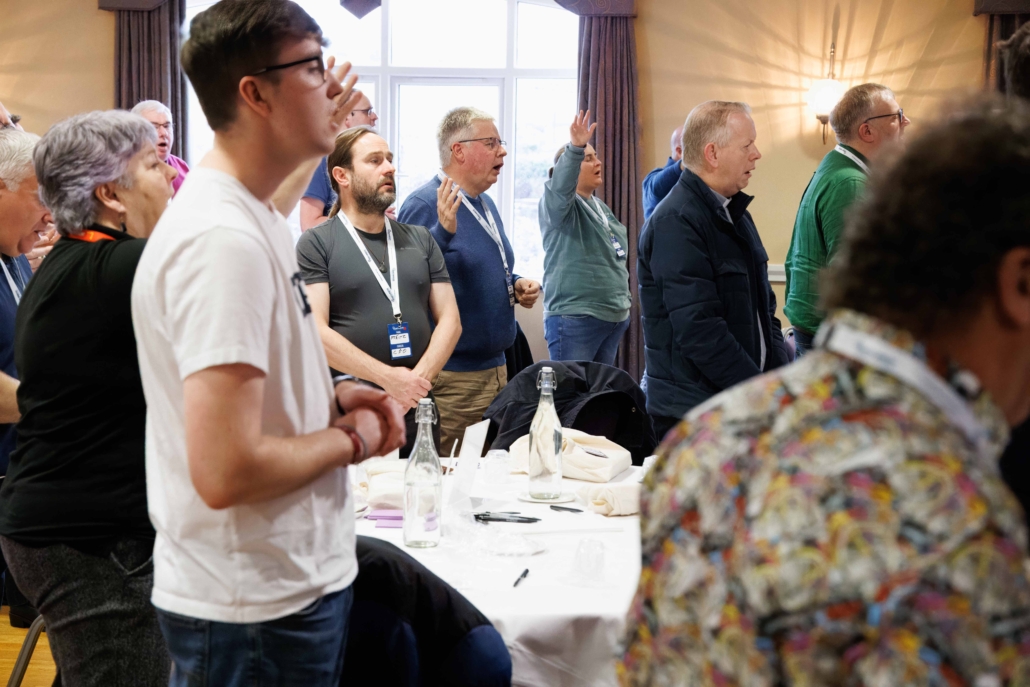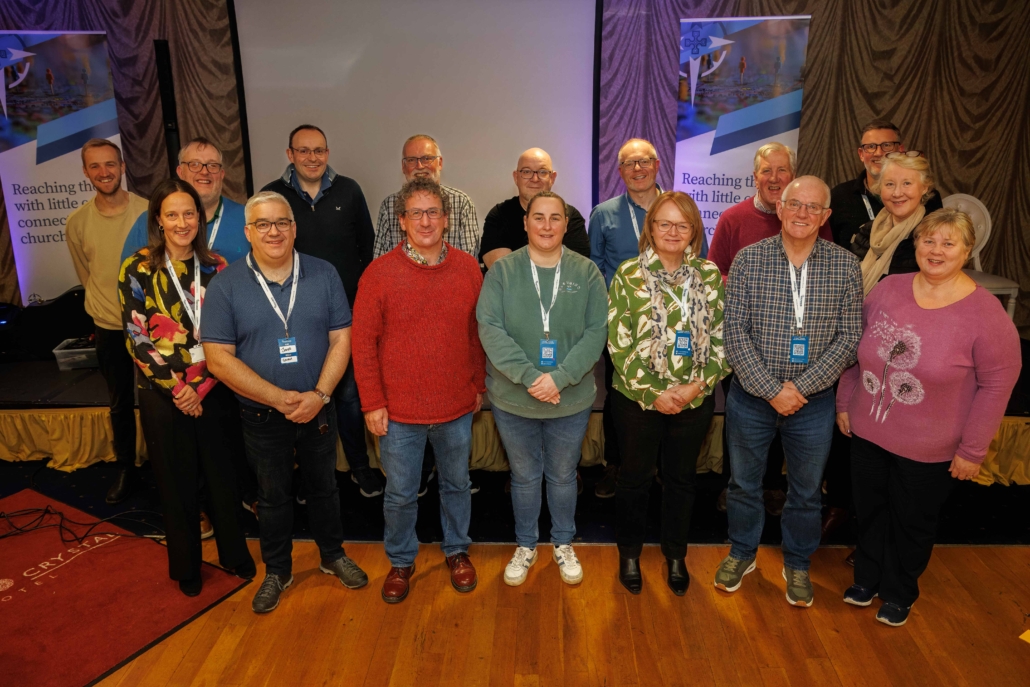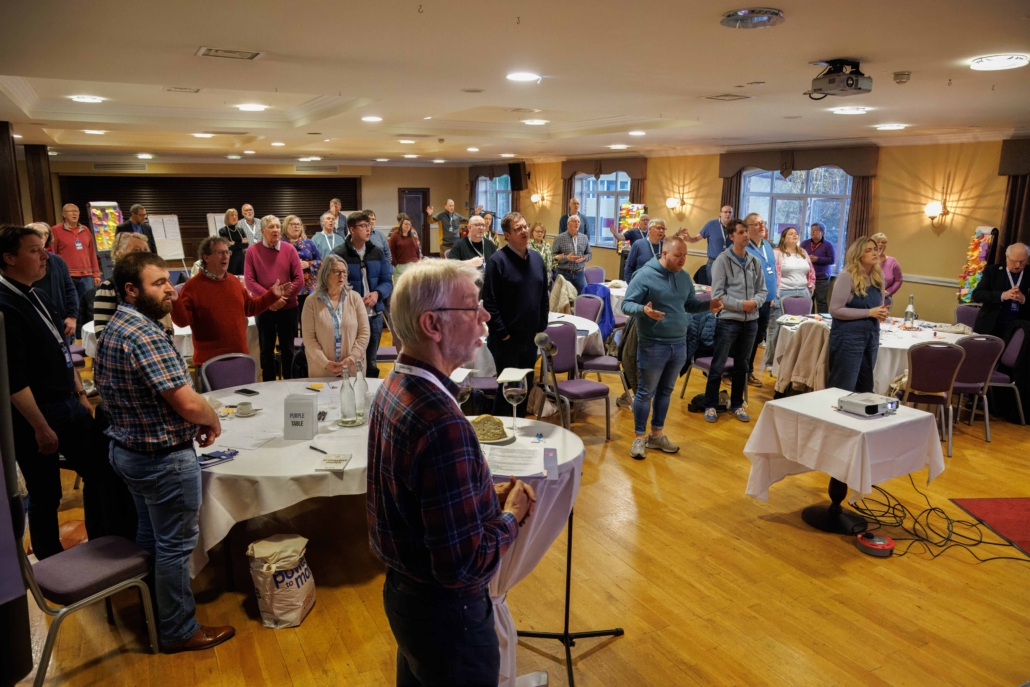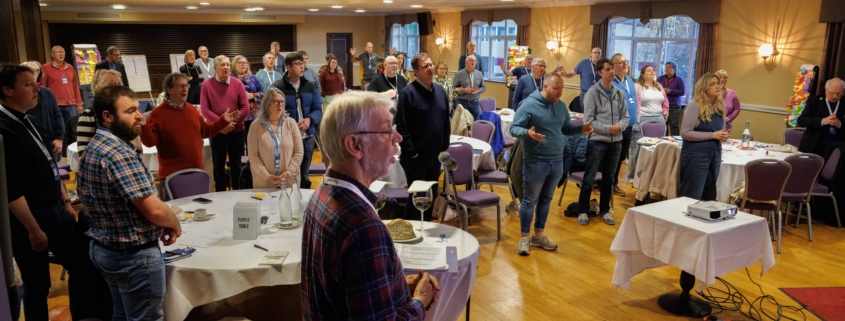Exploring the new paradigm – the Pioneer Ministry Gathering Event
On the day that the Pioneer Ministry gathering came together in the Cavan Crystal Hotel for a conference to set out the way forward, the Irish Times ran a report talking about a ‘new paradigm’ emerging in the Church of Ireland. Pioneer Ministry is a key part of that new paradigm.
From the opening worship, led by Revd Canon Michael Mitton, based on Isaiah 40 1–5: 10,11 and speaking about St Non of Dyfed, the mother of St David the famous Welsh patron saint, it was clear that this new paradigm is not about jettisoning the old for shiny new things, but rather about developing a thoughtful approach to witnessing to the Gospel in today’s society where the vast majority of people no longer have a connection to church.
Rev Rob Jones, the National Director of the Pioneer Ministry Team, explained that Pioneer Ministry does not replace the existing parts of the Church or our faithful pattern of traditional parish life, but rather invites and supports those who have an idea to extend their witness to those with little or no connection to church.
The Pioneer Ministry Initiative has the backing of the House of Bishops, of the General Synod and of the Representative Church Body, which has allocated a budget of €6.8 million over the next 10 years to train pioneers and to provide very generous RB grant funding to approved projects. Since February 2023, 8 pioneer trainees have been selected and four projects are receiving an RB grant, and four already had identified funding in place.
The conference attendance list included invited representatives approved by their Bishop, from all the dioceses, including the Pioneer Diocesan Advocates and representatives of Diocesan Pioneer Ministry Hubs. Most of those expected made it to the venue despite Storm Bert leaving many roads flooded. Attendees included ordained and lay people, and speakers included the Bishop of Down and Dromore, the Rt Revd David McClay, the Bishop of Kilmore, the Rt Revd Ferran Glenfield, Canon Phil Potter (formerly leader of Fresh Expressions UK and now consultant to the Pioneer Ministry team), and leadership team member, Ven Barry Forde. The morning was largely given over to teaching about pioneer ministry. During the afternoon, the diocesan groups began generating their thinking about the opportunities and challenges they have identified.
While a main focus will be on getting a schedule of funded projects off the ground and organising training of pioneers, Rev Rob Jones reminded the attendees that Pioneer Ministry is simply a new way of considering the challenge of how to witness to people who are outside the Church.
It is not simply for funded pioneers; it is also to empower volunteers on the ground at parish level. Not all the dioceses in the room have received funding for a project at this stage. But, with the establishment of Diocesan Advocates in each Diocese, a new network of support is now in place to advocate, support and champion Pioneer Ministry at local level and to encourage anyone with an idea to develop it, through the authority of their Bishop.
The Advocates will act as a source of guidance and encouragement within the diocese. Smaller, non–funded projects, run by lay volunteers are often more achievable, he reminded the diocesan representatives. Parishes and individuals can be empowered by sharing the learning and advice that we are gathering through the bigger projects and training. Often it is the smallest seed that germinates and turns into the mighty tree. Not all projects will require funding, and not all projects will get funding, despite the generosity of the RB’s budget.
Canon Phil Potter described the importance of ‘releasing the laity’ in the Church of England’s work around pioneering, and of the need to form strong, flexible networks of support. Laity often bring a particular perspective to initiatives such as pioneer ministry, and sometimes find it easier to change their focus to find opportunities outside traditional parish life. Ven Barry Forde told the gathering, that while parish ministry forms the primary model for ordained ministry in the Church of Ireland, chaplaincy and other specialist roles also build a range of skills that can be applied effectively to the pioneer ministry approach. Attendees were encouraged to move from ‘Church–shaped mission’ to ‘Mission–shaped Church’.
During the afternoon session, a video was shown of a pioneering project in Tuam, Limerick and Killaloe. TLK is the largest geographical diocesan area, but with a sparse Church of Ireland population. The diocese recognised that the significant built heritage that exists in the diocese is often seen as a burden to be maintained. They tried a shift of focus, instead looking at it from the point of view of those people whom it attracts to the area. These are mainly tourists. The project that emerged focuses on Celtic Christianity, pilgrimage and spirituality and tries to actively engage visitors in the lively Gospel that inspired this heritage while they enjoy soaking in the rich cultural experience of the ancient landscape. The project benefited from the inputs of Ms Valerie Raitt, who had a professional background in tourism as well as a long–time engagement with parish life.
The feedback and learning received from participants will form the basis of a report and action that will be produced by the Pioneer Ministry Team, Rev Rob Jones, Ven Barry Forde and Ms Ingrid Brennan, in the New Year and worked through with each Diocesan Pioneer Advocate, their Pioneer Hub and their Bishop. The dioceses will also be made aware of the Commissioning Services for our first Church of Ireland Pioneer Ministers which have taken place. The gathering concluded with a celebration of Holy Communion.
For more information on Pioneer Ministry, please go to www.pioneerministry.org or contact the National Director, Rev Rob Jones, through his PA, Ingrid Brennan, at [email protected]




